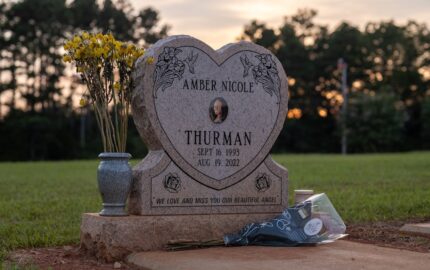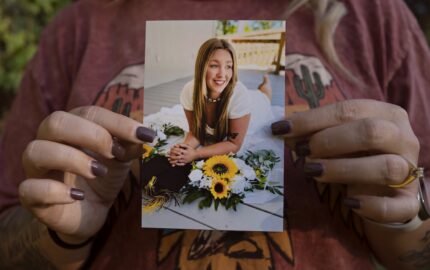En español
CAMBRIDGE, Mass. – The Nieman Fellows at Harvard University have selected Marcela Turati of the Mexican newsmagazine Proceso as this year’s recipient of the Louis M. Lyons Award for Conscience and Integrity in Journalism. Turati was chosen for her coverage of the drug war and her role in protecting and training members of the media. She is a standard-bearer for the journalists who have risked their lives to document the devastating wave of violence in Mexico.
In their nomination, the Nieman Fellows cited Turati’s “journalistic excellence and leadership” and the courage shown by her and other Mexicans covering organized crime.
Mexico has become one of the most dangerous countries in the world for journalists, with more than four dozen killed or gone missing in the past six years.
Turati has long sought to give voice to those who lack political power and access to the media. In 2007, she and her colleagues co-founded Periodistas de a Pie, a journalism network created to support reporters covering issues such as poverty, civic participation and human rights.
As the war against the narcotraffickers intensified, the organization refocused to support journalists covering the conflict and to defend freedom of speech. The network began to train journalists in ethics, personal safety, cybernetics and how to care for their own emotional well-being — and it encouraged more journalists to organize networks to protect themselves and create strategies to avoid censorship. It also helped connect researchers and international human rights organizations with people on the ground affected by violence.
Reflecting on her career, Turati said her greatest challenge has been “how to write about violence without letting people get used to it, how to maintain permanent indignation and hope with each news story.”
In 2010, Turati published the book “Fuego Cruzado: Las Victimas Atrapadas en la Guerra del Narco,” (“Crossfire: Victims Trapped in the Narco-War”), about the impact of drug violence on Mexican society. She also has collaborated on several books and multimedia projects that remember the victims of violence and is editor and co-author of “Migraciones Vemos… Infancias No Sabemos,” about the lives of Mexican migrant workers’ children. “Entre las Cenizas: historias de vida en tiempo de muerte,” (“Amid the Ashes: Stories of Life in a Time of Death”), a book she co-edited about Mexicans who have come together to resist the violence, was recently released.
Turati previously reported for the Mexican newspapers Reforma and Excelsior, worked as a freelance journalist and created the blog and an online discussion group Periodismo de Esperanza (Journalism of Hope) after spending two years exploring the question of whether it is possible for journalism to bring about change. She has written for newspapers and magazines in Latin America and the United States.
The Louis Lyons award will be presented to Turati during an event at the Nieman Foundation for Journalism at Harvard on Feb. 7, 2013.
The Nieman class of 1964 established the Louis M. Lyons Award in honor of the Nieman Foundation curator who retired that year after leading the institution for a quarter of a century. Lyons was a forceful advocate for freedom of the press. While he was curator of the Nieman Foundation, he broke new ground by diversifying the class of fellows to include women, minorities, and international fellows. The award honors displays of conscience and integrity by individuals, groups or institutions in communications. The winner is chosen each year by the members of the Nieman class.
The 2013 Nieman Fellows, including 12 international and 12 U.S. journalists, selected Turati because she is one of the few reporters who has consistently reported on the drug war’s victims, and because of her dedication to ensuring the survival of her fellow journalists.
“Reporters like Turati have seen many colleagues disappear or be brutally murdered or forced to flee the country. And yet they continue to believe they can make a difference. They continue to bear witness,” the fellows said in their nomination.
For the past 75 years, the Nieman Foundation for Journalism at Harvard has educated journalism’s leaders and elevated the standards of the profession through special programs that convene scholars and experts in all fields. More than 1,300 journalists from 92 countries have been awarded Nieman Fellowships since the foundation was established in 1938. Each year, accomplished and promising journalists come together at Harvard for a year of study, seminars, master classes and journalism conferences. The foundation’s other initiatives include Nieman Reports, a quarterly magazine and website that explores contemporary challenges and opportunities in journalism; the Nieman Journalism Lab, a website that reports on the future of news, innovation and best practices in the digital media age; and Nieman Storyboard, a website that showcases exceptional narrative journalism and explores the future of nonfiction storytelling.
CAMBRIDGE, Mass. – The Nieman Fellows at Harvard University have selected Marcela Turati of the Mexican newsmagazine Proceso as this year’s recipient of the Louis M. Lyons Award for Conscience and Integrity in Journalism. Turati was chosen for her coverage of the drug war and her role in protecting and training members of the media. She is a standard-bearer for the journalists who have risked their lives to document the devastating wave of violence in Mexico.
In their nomination, the Nieman Fellows cited Turati’s “journalistic excellence and leadership” and the courage shown by her and other Mexicans covering organized crime.
Mexico has become one of the most dangerous countries in the world for journalists, with more than four dozen killed or gone missing in the past six years.
Turati has long sought to give voice to those who lack political power and access to the media. In 2007, she and her colleagues co-founded Periodistas de a Pie, a journalism network created to support reporters covering issues such as poverty, civic participation and human rights.
As the war against the narcotraffickers intensified, the organization refocused to support journalists covering the conflict and to defend freedom of speech. The network began to train journalists in ethics, personal safety, cybernetics and how to care for their own emotional well-being — and it encouraged more journalists to organize networks to protect themselves and create strategies to avoid censorship. It also helped connect researchers and international human rights organizations with people on the ground affected by violence.
Reflecting on her career, Turati said her greatest challenge has been “how to write about violence without letting people get used to it, how to maintain permanent indignation and hope with each news story.”
In 2010, Turati published the book “Fuego Cruzado: Las Victimas Atrapadas en la Guerra del Narco,” (“Crossfire: Victims Trapped in the Narco-War”), about the impact of drug violence on Mexican society. She also has collaborated on several books and multimedia projects that remember the victims of violence and is editor and co-author of “Migraciones Vemos… Infancias No Sabemos,” about the lives of Mexican migrant workers’ children. “Entre las Cenizas: historias de vida en tiempo de muerte,” (“Amid the Ashes: Stories of Life in a Time of Death”), a book she co-edited about Mexicans who have come together to resist the violence, was recently released.
Turati previously reported for the Mexican newspapers Reforma and Excelsior, worked as a freelance journalist and created the blog and an online discussion group Periodismo de Esperanza (Journalism of Hope) after spending two years exploring the question of whether it is possible for journalism to bring about change. She has written for newspapers and magazines in Latin America and the United States.
The Louis Lyons award will be presented to Turati during an event at the Nieman Foundation for Journalism at Harvard on Feb. 7, 2013.
The Nieman class of 1964 established the Louis M. Lyons Award in honor of the Nieman Foundation curator who retired that year after leading the institution for a quarter of a century. Lyons was a forceful advocate for freedom of the press. While he was curator of the Nieman Foundation, he broke new ground by diversifying the class of fellows to include women, minorities, and international fellows. The award honors displays of conscience and integrity by individuals, groups or institutions in communications. The winner is chosen each year by the members of the Nieman class.
The 2013 Nieman Fellows, including 12 international and 12 U.S. journalists, selected Turati because she is one of the few reporters who has consistently reported on the drug war’s victims, and because of her dedication to ensuring the survival of her fellow journalists.
“Reporters like Turati have seen many colleagues disappear or be brutally murdered or forced to flee the country. And yet they continue to believe they can make a difference. They continue to bear witness,” the fellows said in their nomination.
For the past 75 years, the Nieman Foundation for Journalism at Harvard has educated journalism’s leaders and elevated the standards of the profession through special programs that convene scholars and experts in all fields. More than 1,300 journalists from 92 countries have been awarded Nieman Fellowships since the foundation was established in 1938. Each year, accomplished and promising journalists come together at Harvard for a year of study, seminars, master classes and journalism conferences. The foundation’s other initiatives include Nieman Reports, a quarterly magazine and website that explores contemporary challenges and opportunities in journalism; the Nieman Journalism Lab, a website that reports on the future of news, innovation and best practices in the digital media age; and Nieman Storyboard, a website that showcases exceptional narrative journalism and explores the future of nonfiction storytelling.


